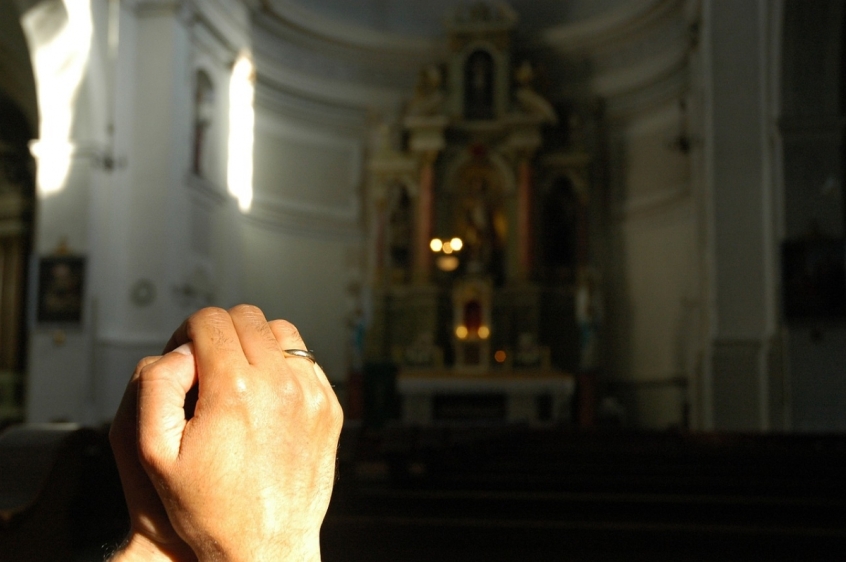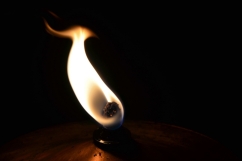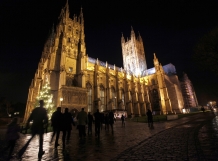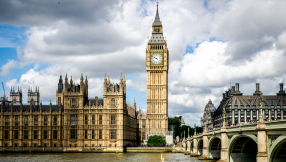
This Sunday, Christians in many UK churches will be praying the Lord's Prayer with special fervour. It's the culmination of a week of prayer leading up to Pentecost that has seen Church of England congregations focusing on the words "Thy Kingdom Come" as a prayer for renewal and empowerment.
In the traditional version still used in many churches, the whole sentence reads: "Thy Kingdom come, thy will be done in earth, as it is in heaven."
What we call the Lord's Prayer was given by Jesus to his disciples as a pattern prayer for them in the Sermon on the Mount (Matthew 6:9-13). It's usually said with the ancient addition: "For thine is the kingdom, and the power, and the glory, for ever and ever, Amen." As Matthew tells it comes as part of Jesus' teaching to his disciples on prayer. In Luke 11:2-4 most of it is there again, this time in response to a request from the disciples that Jesus "teach us to pray".
There are huge advantages in saying it Sunday by Sunday. It works its way into our inmost spiritual life. It gives us words to say when we can't think of anything else. It provides a shape for our prayer life, and it's a spiritual resource to draw on when all else fails.
But its constant repetition can deafen us to its revolutionary force.
Properly understood, the Lord's Prayer is a world-changing statement. The words "your will be done, on earth as in heaven" are supremely radical. They commit Christians to working with God to see that the world reflects the fullness of God's grace and glory. It's to be a place where justice is done, where people are healed and restored, where everyone lives to their full potential, and where sin and suffering are no more.
That's what heaven is like, where God's will is done perfectly.
In the Lord's Prayer, Christians pray that this world will be the same. And we are not allowed to pray for something to happen without trying, as best we can, to help make it happen. So the Lord's Prayer isn't just a call for God to do something, it's a commitment for us to do something.
So when we pray that prayer, let's try to have these three things in mind.
1. Am I living it out in my own life? In our interactions with other people we can make life a heaven or a hell. The way we are in our family, how we treat our spouse or children, our colleagues or employees, can have an enormous effect on them. We can build up or we can tear down. If heaven is a place where God's will is done perfectly and earth is meant to reflect that, we will go through life trying as hard as we can to build people up.
2. Am I aware of how unlike heaven the world is? It's very easy for Christians to become very insular, concerned only for "church" issues. But conversion is about much more than going to heaven when we die – and Christian discipleship is about much more than just making new Christians. Part of that discipleship is being willing to be painfully aware of the dark side of life here on earth. We should know about poverty, illness and injustice, and care about it. It should make us stress the word "your": "Your kingdom come, your will be done." At the moment, in too many places, it isn't: it's a flawed and sinful human will, all too often driven by a demonic energy to do harm.
3. Am I willing to do something? The great questions of the day seem far too big for us. There's not much we can do about war in Syria or climate change or refugees. But we can do something, and it's not without significance: what someone has called "taking hold of the near edge" of the problem. We can't solve the refugee crisis, but we can challenge prejudice against immigrants. We can't stop the war in Syria, but we can give to charities working in the field. We can't stop climate change, but we can live more simply.
"Your will be done on earth as in heaven" isn't just verbal wallpaper, the comforting aural backdrop to just another service. It's a dangerous, frightening, demanding and inspiring description of another reality, that challenges apathetic collusion with the powers that be. It's a call to resist; it's a battle cry.
Follow Mark Woods on Twitter: @RevMarkWoods

















